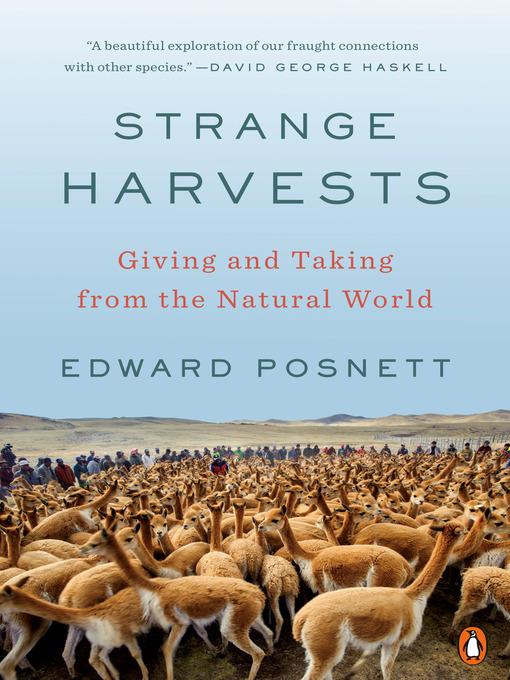
Strange Harvests
Giving and Taking from the Natural World
کتاب های مرتبط
- اطلاعات
- نقد و بررسی
- دیدگاه کاربران
نقد و بررسی

April 22, 2019
First-time author Posnett combines a background in modern-day finance and an interest in historical trade practices in this evocative look at precious natural objects. He begins with eiderdown, the soft down feathers of eider ducks, long used around in the world in bedding and garments. He goes on to edible bird’s nests, vegetable ivory, sea silk, guano, and other trade items, examining their fluctuating value as international commodities and their natural environs, many of which are now endangered. Occasionally, Posnett offers the objects as history in a nutshell, noting that if Iceland’s cultivation of eider, where the species has long been protected, attests to the country’s “steady rhythms, its insulation from cataclysms, then Russian eiderdown is a portrait of the country’s constant political upheavals”; a Russian biologist notes her country has never successfully cultivated the species. But for the most part, he is careful not to overextend his reach and concentrates on delivering scrupulous descriptions of his subjects and their locales, including both desolate fjords and tropical caves. In the best passages, he capture the harvesters at work, from an Icelandic priest gently lifting eiderdown from abandoned nests, to a Borneo bird nest harvester trodding in flip-flops through ankle-deep guano. Posnett aims to record “for posterity” the wondrous details of these objects—and he succeeds marvelously.

June 1, 2019
Posnett scours the globe for natural commodities that sustain a balance in which consumption doesn't lead to destruction and harvesting involves replenishing and renewal. It is a challenge to categorize both the book and its author, a former financial investigator born in London and based in Philadelphia whose interest in markets and trades piqued his interest in writing about the natural world. In his first book, he pleasingly evokes an era in which "the object from the wild often performed an important literary function in a specific popular genre, the Victorian quest romance." Each of the seven chapters details such a quest into the exotic and the wilderness in search of some organic golden fleece that has been commodified for luxury consumption. Each has its own fascination: There's the down from the eider, a "fat seabird, more penguin than duck," which sheds feathers that are then gathered by harvesters in Iceland with no apparent harm to the duck, though luxury profit ultimately compromises the process. When a single down jacket can retail for $8,000, there is plenty of incentive to take the birds out of their natural habitat, increase their number and their production, and thus risk killing the golden goose. A local compares eiderdown to cocaine, which is worth much more on the street than at its source, a comparison that does not lend itself to purity of process. In other chapters, the author explores the trade in bird guano (for fertilizer), sea silk (spun by mussels and other mollusks to anchor them), and the tagua nut, which had been used for buttons and carvings and is biodegradable where plastic is not. The most strangely exotic story may be that of civet coffee: The catlike animal digests only the finest coffee beans, flavors them with its enzymes, and then excretes them for harvesting, adding digestive enzymes to the coffee's distinctive flavor. Throughout the book, the author's writing derives less from naturalists and environmentalists and more from the likes of Borges and Calvino. An engrossing tale of wonder.
COPYRIGHT(2019) Kirkus Reviews, ALL RIGHTS RESERVED.

July 1, 2019
Using the historical "curiosity cabinet" as a backdrop, debut author Posnett follows seven objects from their origin to their use: eiderdown, vicuña fiber, sea silk, tagua, civet coffee, guano, and swiftlet bird nests. Starting at the source, he attempts to peel back each item's commodification to reveal the item itself and its myth, folklore, history, and use. In doing so, he traces each object's meaning and relationship with humanity. Posnett's book tries to be more than just a general history in that it does not tell a linear story but instead uses each chapter to weave together the histories, myths, traditions, and current practices of each individual object. To tell this story, he visits harvesters and producers, trekking across different countries in order to experience the object itself instead of the object just as a commodity. As such the book also becomes a travelog and a philosophical muse on humanity's relationship to nature and whether it can change to be more beneficial instead of solely exploitative. VERDICT Readers who like microhistories and travelogs will enjoy.--Laura Hiatt, Fort Collins, CO
Copyright 2019 Library Journal, LLC Used with permission.

July 1, 2019
Building from an award-winning essay about Icelandic families who harvest eiderdown, Posnett went into the field to learn more about six other natural objects: sea silk, vegetable ivory, civet coffee, guano, edible birds' nests, and vicu�a fiber. At first his travels mirror the wonder and excitement recorded by earlier naturalists and explorers, but as he learns more about the manner in which these materials are harvested (the report on civets is particularly bleak) and how much people at the end of the supply chain reap profits at the expense of those who do the actual work, he reconsiders the allure of his subjects and transforms himself into a determined investigator. The themes of economic inequality and cultural disruption, combined with issues of animal husbandry and ecology, make Strange Harvests a deeper, more thoughtful narrative than readers may expect. Posnett's essays far and meaningfully exceed the promise of his title and show this debut author to be more than worthy of comparisons to other questing and curious nonfiction writers, such as Edward Humes, David Kirby, and Heather Rogers.(Reprinted with permission of Booklist, copyright 2019, American Library Association.)

























دیدگاه کاربران